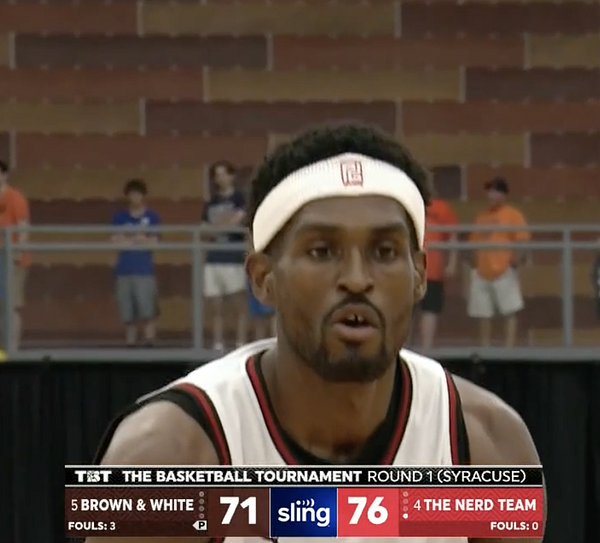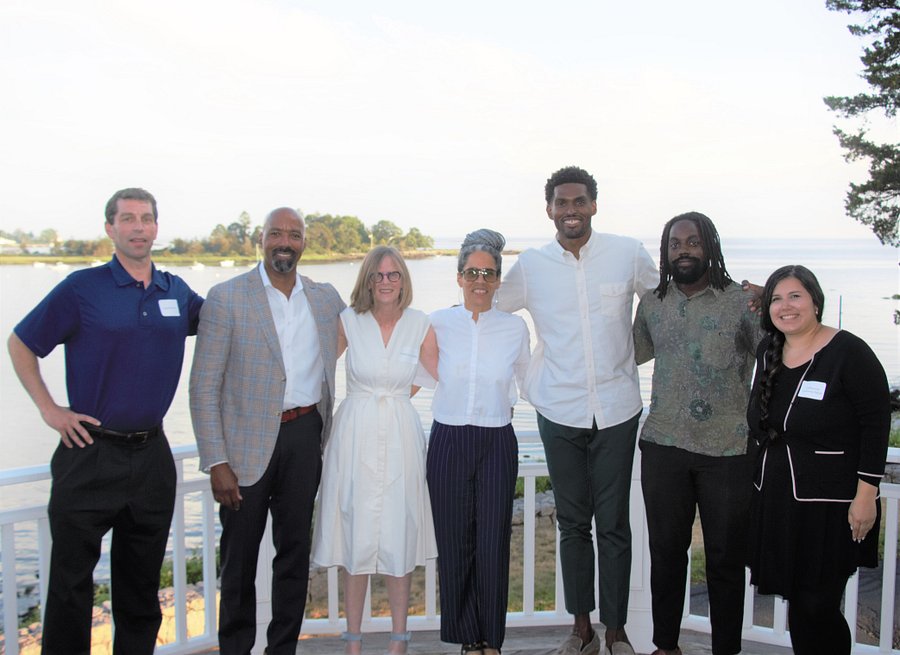
Connecticut CASA, a New Haven-based nonprofit organization, submitted the following account of a recent event held on its behalf.
…
The Court Appointed Special Advocates (CASA) movement, now in the Waterbury as well as New Haven child protection courts, is growing toward statewide reach. (See the Newsroom.)
Following a 2021 “Cooking for CASA” event over Zoom with Chef Claire Criscuolo, Connecticut CASA held its first in-person Benefit event, Thursday, July 14, 2022.
Addressing “Music, Culture, Social Change,” the evening featured a panel discussion moderated by Jeffrey Ogbar, Professor of History and founding Director of the Center for the Study of Popular Music at UConn. Panelists were:
- Lisa Dent, Executive Director of Artspace;
- Brandon Sherrod, Connecticut CASA ambassador, musical artist, and pro basketball player;
- Bradford Watson, CEO/Founder of Spinach Records.
Brandon Sherrod (on Spotify here) played the piano and sang, too. Though he also writes and performs original songs (for example, “Corona Freestyle”) and has a new album due out in October, on this occasion Brandon did acoustic renditions of “Lean on Me” (by Bill Withers) and “Ordinary People” (by John Legend).
Sponsors were Yale University, Claire’s Corner Copia, NewAlliance Foundation, and Russell Hall Co. Chef Claire Criscuolo of Claire’s donated catering, with the Wine Thief donating wine.
{image 1 – headshots of all 4 panelists with title of event}
Historical Context, Music, Identity, Mental Health
Professor Ogbar — as a historian whose next book, for Basic Books, is on white nationalism in the shaping of Atlanta — framed the discussion with allusions to figures ranging from Billie Holiday, Sam Cooke, and Nina Simone to Woody Guthrie. Then, Jeff Ogbar (who grew up in Chicago and Los Angeles in the 1970s and ’80s before attending Morehouse College in Atlanta) spoke of the 1980s, when urban deindustrialization, fraying social safety nets, rising crime and incarceration coincided with the rise of hip-hop. He noted that the genre has seen both misogyny and female empowerment, glorification of materialistic capitalism and critiques of extreme inequality, mass incarceration, and violence.
Lisa Dent, with a career across artistic media before her current leadership role at Artspace, evoked “Prince and the Revolution” as a point of departure, for not only music but understanding of gender fluidity and other matters of identity. As the conversation moved from music and culture to mental health, she remembered her late father, a psychiatrist who preceded her at Howard University and became a trusted confidant to many, including to fellow Black men.
The challenge of sharing one’s vulnerability, especially in the public eye and especially given bias around Black masculinity, was another theme.
Brandon Sherrod spoke about intersections of artists and athletes. A native of Bridgeport, he came to prominence nationally when, as a Yale political science student and member of the men’s basketball team, he left the university during 2014 – 15 to tour the world as a Whiffenpoof singer. (See articles in the New York Times, Guardian, ESPN, Boston Globe, Sports Illustrated, etc. ) He returned a year later, helping his team to win the Ivy League and defeat Baylor in the NCAA tournament, while setting the NCAA record for consecutive field goals. Since, he spent five years playing pro basketball (and speaking Italian) in Italy, before playing in Finland and then Israel in 2021 – 22. As noted at the July 14 Benefit event, he is playing this summer with the “Nerd Team” in a national tournament televised by ESPN.
{image 2 – Brandon at free throw line for the Nerd Team, 7/22/22}
(That team won its first two games, Brandon among three former Yale players — with Azar Swaim and Jordan Bruner — in the starting lineup. The team is scheduled to play again Monday night, July 25, at 7 p.m. on ESPN2.)
Along the way, Brandon is creating his own musical catalog with pioneering label Spinach Records.
Bradford Watson, his colleague as CEO/Founder of Spinach Records, spoke about the label’s fundamental emphasis on artists’ mental health. A graduate of Wilbur Cross High School and more recently of Harvard, he recalled meeting Brandon in New Haven — while the latter was a Yale undergraduate and Brad Watson himself was still in high school. Their artistic collaboration continues to develop, as Spinach Records now has a recording space in midtown Manhattan, while balancing music with artists’ well-being.
Q & A with the Audience
In attendance were not only Board and other volunteers for Connecticut CASA (such as Advisory Council member Jessica Sager of All Our Kin) but also a range of leaders and advocates from across the region — from Ronnell Higgins of Yale University to Dotty Weston-Murphy of the Community Foundation for Greater New Haven and Lauren Ruth of CT Voices for Children.
Amos Smith, who as CEO of the Community Action Agency of New Haven was one of four colleagues from that agency at the July 14 event, commented as a former clinician himself — on the power he saw in this public discussion of mental health (days before the new national 988 hotline took effect).
In response to a question from Lindy Lee Gold (whose civic leadership with nonprofits from ‘r Kids to Christian Community Action is well documented), Bradford Watson explained that Spinach Records is indeed now a B Corp, after having begun in the form of an LLC.
An Ironically Named “Gang”; toward Community
Brad Watson also conveyed the label’s ironically named Instagram handle: @SpinachGang. The company obviously defies stereotypical assumptions about “gangs,” while offering camaraderie and mutual support to its community.
“Community” was a word that Brandon Sherrod used in concluding with his singing of Bill Withers’ and John Legend’s songs, each of which elicited rousing applause.
(In the days ahead, see Connecticut CASA’s YouTube channel for video of Brandon’s rendition of “Lean on Me” — piano and voice.)
Community is also (with collaboration, integrity, respect, quality, service, and stewardship) among Connecticut CASA’s core values.
Connecticut CASA Growing
The Court Appointed Special Advocates (CASA) movement is now in Waterbury as well as New Haven, the two largest Child Protection courts, growing toward statewide reach. (See the Newsroom.)
The CASA program model assumes 1 staff person for each 30 volunteers, on average serving 75 children in need. Working with professionals in the child welfare system, Connecticut CASA’s volunteers are supervised by staff who ensure high-quality advocacy and follow-through, including regular reporting to judges.
The organization is expanding under a 2016 state law, as discussed in June 2021 opinion pieces in the Connecticut Mirror and New Haven Register, along with news articles in the New Haven Register among other places, as well as a TV interview with Ann Nyberg of WTNH Channel 8.
The CASA approach is associated with greater stability, fewer placements and increased permanency for children, as those with CASA volunteers are only half as likely to return to the foster care system and spend 25% less time there, with a one-on-one connection to an adult and greater access to community services through the sustained, resourceful efforts of that caring adult. Connecticut CASA is governed by a Board, who with an Advisory Council, Ambassadors, and professional staff extend the reach of Volunteers for children’s best interests.
CASA volunteers meet with children regularly, getting to know them and their circumstances — including teachers and social workers, foster parents and families. CASA receives court appointments in both Foster Care and Protective Supervision cases. Carefully screened and trained through a systematic curriculum and part of a national network recognized for improving outcomes, CASA volunteers make evidence-based recommendations to judges. At the center: these caring, consistent volunteers’ relationships with the children themselves — with whom these adults can make a lifelong difference through one-on-one interactions at a difficult time.
Connecticut CASA is funded through a blend of public dollars, foundation grants, individual donations, and sponsorships such as those that made the July 14 Benefit possible.
Visit the website at ConnecticutCASA.org for information about the CASA role; how to volunteer; news on grants, partners, Great Give fundraising, the board, advisors, and ambassadors—both former Yale student athletes. Social media include a new YouTube channel, atYouTube.com/ConnecticutCASA.



A studio version of one of the songs Brandon Sherrod performed: "Ordinary People" by John Legend